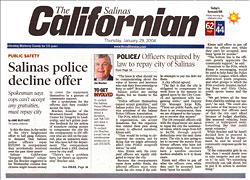Resources...
Front page news (Integrity Matters)
Involvement
Salinas police decline
offer
Spokesman says cops can't accept any gratuities, must
repay city
By ANNE RILEY-KATZ
The Salinas Californian
 Is
this the time, in the midst of the city's heightened effort
to halt gang violence, to demand that Salinas police officers
repay $327,000 in overpayment they accidentally received
over the past three years?
Is
this the time, in the midst of the city's heightened effort
to halt gang violence, to demand that Salinas police officers
repay $327,000 in overpayment they accidentally received
over the past three years?
Salinas Californian "Integrity Matters" columnist
Jim Bracher suggested in his Wednesday column that citizens
might donate money to cover the repayment themselves in
a gesture of community support.
But a spokesman for the officers said they couldn't
accept the help.
Bracher, founder of the Monterey-based Bracher Center
for Integrity in Leadership, said he's gotten positive
feedback for his notion of somehow raising money to compensate
the city for the overpayment to 134 officers who are still
on the payroll, plus an unknown number who have left the
department. The overpayment resulted from a 2001 clerical
error by city staff.
"There's not a problem here, but there's an opportunity,"
Bracher said.
"The issue is what should we be communicating about
the value of heroes and heroines who risk their lives
everyday to keep us safe?" Bracher said.
Salinas police are saying thanks, but no thanks to the
offer.
"Police officers themselves cannot accept gratuities,"
said Salinas police Det. Kyle Kimm, vice president of
the Salinas Police Officers Association.
The POA, which is a nonprofit organization, can accept
donations. But the organization cannot then pass along
money to affected members, Kimm said.
"That would be trying to circumvent the system,
and by doing that we might adversely affect (the POA's)
nonprofit status," he said.
Also, Kimm said, the overpaid officers are legally obligated
to repay the city.
Because the overpayments came from public funds, the affected
officers must reimburse the city even if the public attempts
to pay the debt for them.
A city official agreed.
"The fact is that the city is obligated to compensate
its work force in the manner so agreed upon by the City
Council and agreement with bargaining units," said
Deputy City Manager Jorge Rifa. "These are public
funds, and if there is an overpayment, then we are obligated
to the taxpayers to recover that money."
The 134 overpaid officers still with the department
are slated to repay the city the unintended raises, which
range from $25 to $4,750, through payroll deductions over
the next three years. The city is also going to try to
recover the money from former officers who have left the
department, but doesn't have a surefire recovery method
available to it in those cases.
Kimm said offers to pay off what the officers owe, while
they can't be accepted, have been "great for morale."
"The bottom line is the officers greatly appreciate
the community support," he said.
Donations to the POA, which Kimm is encouraging, would
be used to help fund the Police Activities League, which
offers after-school youth programs, and other groups to
which the POA routinely donates, including Boys and Girls
Clubs, youth sports teams and the like.
"We get letters all the time from charities seeking
our support," he said. "We could also use some
of that money to buy equipment that officers need or that
the city can't afford because of budget shortfalls, like
armored vehicles, body armor, or bulletproof vests. Something
like that could speak volumes."
While Bracher said he hasn't decided how to proceed
in raising funds for the department, he said he would
let community response guide his effort.
"If the community gets in on this, then I would
dearly love to take integrity and put legs on it,"
he said. "It's something everybody can talk about,
but to put it in action is another thing."
Originally published Thursday, January 29, 2004
Home Page | About
Us | Ask Bracher | Services
| Resources | Contact
Us